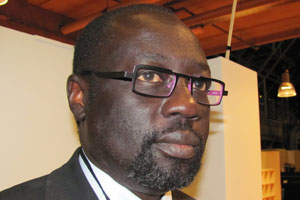They may be the least powerful nations represented in Copenhagen, but those facing imminent threats from a warming planet have made it clear that their future depends on a meaningful agreement here.
The Alliance of Small Island States and the G77, the bloc of the world’s most impoverished nations, are presenting a united front against proposals from the developed nations that are neither legally binding nor as strong as they would like to see. The level of warming that would be allowed under the proposal will mean certain catastrophe for some nations, say the leaders of the AOSIS negotiators.
“Some of the delegations need a dose of reality. We bring that reality,” said AOSIS chair Dessima Williams of Grenada. “We will go underwater. There’s no doubt about that.”
Delegates from the AOSIS nation Tuvalu, one of the first victims of a warming world, drew attention earlier this week for walking out of one meeting over this issue. Now the bloc has produced its own PROPOSAL as a counter to the draft from developed nations, calling for a legally binding deal and a maximum of 1.5 degrees Celcius warming. They also call for carbon dioxide in the atmosphere to be limited to 350 parts per million—a figure that has been endorsed by a number of climate scientists but has not been included in draft agreements from developed nations so far.
But US envoy Stern insisted that the focus should stay on the 2-degree warming target, which the G20 leaders agreed to earlier this year. “I understand their focus on 1.5, and I’m absolutely not going to criticize it … but if we can take a strong step, informed by the 2 degree goal, that would be great,” said Stern. “We have to combine science and pragmatism … You’re not going to get anything done in what is after all a political world if you are looking at science in a way that is not attached to the art of the possible.”
Lumumba Stanislaus Di-Aping, the Sudanese chairman of the Group of 77, said that the temperature targets and the financing that Stern is supporting FALL far short of what is needed. “He is basically condemning Africa to death,” said Di-Aping.
The draft also lacks concrete figures for how much money developed nations will devote to climate change adaptation and the development of clean energy technologies in the developing world. The US and the EU have endorsed the idea of a $10 billion short-term fund, though there has not been agreement on longer-term funding. Di-Aping, the Sudanese chairman of the Group of 77, suggested on Thursday that it should be more like $200 billion, and on Friday said $400 billion. The AOSIS text doesn’t call for a specific level of funding, only urging that it be included for immediate assistance to island nations and other vulnerable countries. Williams suggested a figure in the range of 1.5 percent of the GDP of developed nations in remarks on Friday.
“The developing countries have called for an adequate level, commensurate with the need,” said Williams. “What is adequate has to be responsive to the threat … It must be responsive to the damage that’s already done.”
“We are trying to take care of each other in the islands,” said Antonio Lima, a delegate from Cape Verde and the Vice President of AOSIS. “If we leave Copenhagen without a legally binding outcome, if we leave without a very strong commitment on finance … how do you want us to go in front of our children and tell them we did not achieve anything?”
The division between the G77 and AOSIS and the developed nations has threatened to derail talks here, as ministers plan to arrive over the weekend for the next step of negotiations. So while they may not yield as much political power, vulnerable nations have caused quite a stir here so far.
“We are small, but we have to yell sometimes,” said Lima.









